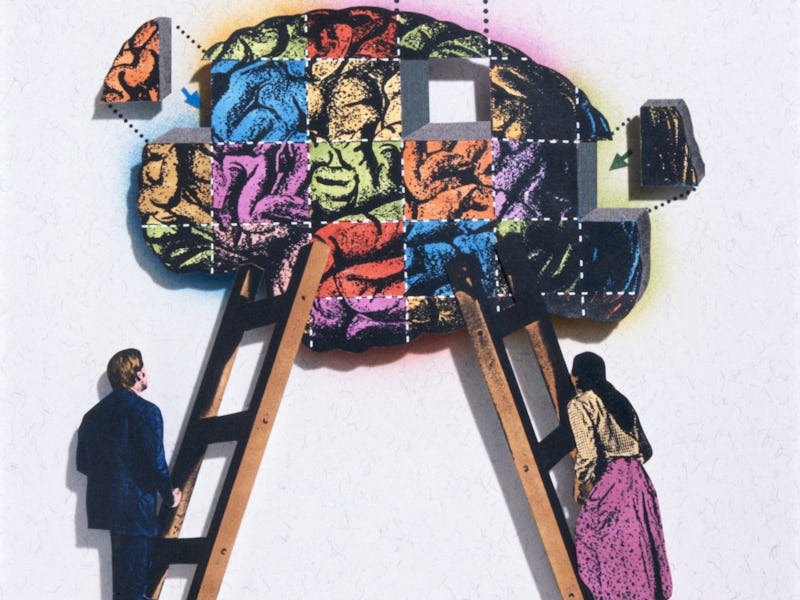How diet and exercise impact memory hinges on 1 uncontrollable factor
The best way to stave off memory loss depends on your genes.

Decades of research show humans experience cognitive changes as they age: Many people experience memory loss, slowed thought processing, dementia, and Alzheimer’s.
To stay sharp into their sunset years, many people mix up their diet and up their physical activity. But according to a new study, healthier choices — and their results — depend on one uncontrollable factor: genes.
“Lifestyle — exercise and diet — will affect people differently according to very tiny variations in their genes,” senior author Sandrine Thuret, a neuroscientist at King’s College London, tells Inverse.
Changing your life can help delay cognitive decline, but how much is influenced by your genetic makeup, Thuret's work suggests.
“The safest approach is to have a healthy lifestyle," Thuret says. "Exercising and eating a diet close to the Mediterranean diet to slow down cognitive aging.”
Thuret and her team published their study Thursday in the journal Communications Biology.
To explore the complex interplay between genes, aging, diet, and exercise, the researchers took an unconventional approach: Typically, researchers draw from epidemiological data then experiment in the lab with animals and humans. In this study, Thuret and her team worked backward.
They started experimenting with neural stem cells in vitro, or in a dish, Thuret says, to see which genes mattered most. They exposed human neural stem cells to serums from either young or old individuals and to chemicals that mimic the aging process. In this case, "serums" are mixed blood samples — a serum is the fluid and solute component of blood, which doesn't play a role in clotting.
The importance of neural stem cells — Neural stem cells are self-renewing cells responsible for generating neurons and glia in the brain. They help keep the brain’s communication speedy and efficient, and as we age, maintaining neural stem cells becomes increasingly important.
Experimenting with neural stem cells helped the team identify 16 specific genes that they identify as likely key players in the game of aging.
A colony of neural stem cells.
After these initial experiments, the scientists also analyzed epidemiological data from over 2,000 different people related to these genes.
This targeted approach reduced the number of “false positives,” Thuret explains, and revealed that two genes, called ABTB1 and GRB10, influenced memory and nutrient-sensing pathways. These pathways underlie the cell's ability to recognize and respond to fuels like glucose.
These two powerful genes seem to modulate the outcomes of lifestyle choices more than others, the study suggests. Their influence comes down to the neural stem cells concentrated in the brain’s hippocampus.
“Those genes are regulated when neural stem cells age, and the variation on those same genes are related to cognitive aging," Thuret explains. "This effect is mitigated when you add lifestyle like exercise and diet,” Thuret says.
Why different genes matter — The research shows that eating a Mediterranean diet may be most beneficial for people with specific GRB10 variations, Thuret explains. Meanwhile, upping exercise may be most beneficial for participants with specific SIRT1 variations.
The team also found that variations in ABTB1 are related to performance on a standard memory task.
The study indicates that nutrient-sensing pathways also play an important role in memory and suggests that the ABTB1 and GRB10 genes are likely molecular links for the association between diet, the aging of neural stem cells and our memory ability, Chiara de Lucia, lead author and a neuroscientist King's College London, said in a related statement.
"Identifying these genes as the missing links between these three important variables could inform new approaches to help improve the aging process through targeted changes in diet and exercise and ultimately in developing new drugs in the future," Lucia says.
However, it’s not as simple as "good genes" equal good brain function. Instead, genetic clues may indicate who benefits from what type of diet or exercise — benefits that can translate to a sharper brain as one gets older.
We still have a long way to go to understand how lifestyle and genetics shape health. However, Thuret, Lucia and their team are on it.
"Finding the means to prevent or slow down the processes that drive the decline of our thought processes during aging," Thuret says, "is one of the great endeavors of the 21st century."
Abstract: Aging induces cellular and molecular changes including modification of stem cell pools. In particular, alterations in aging neural stem cells (NSCs) are linked to age-related cognitive decline which can be modulated by lifestyle. Nutrient-sensing pathways provide a molecular basis for the link between lifestyle and cognitive decline. Adopting a back-translation strategy using stem cell biology to inform epidemiological analyses, here we show associations between cellular readouts of NSC maintenance and expression levels of nutrient-sensing genes following NSC exposure to aging human serum as well as morphological and gene expression alterations following repeated passaging. Epidemiological analyses on the identified genes showed associations between polymorphisms in SIRT1 and ABTB1 and cognitive performance as well as interactions between SIRT1 genotype and physical activity and between GRB10 genotype and adherence to a Mediterranean diet. Our study contributes to the understanding of neural stem cell molecular mechanisms underlying human cognitive aging and hints at lifestyle modifiable factors.